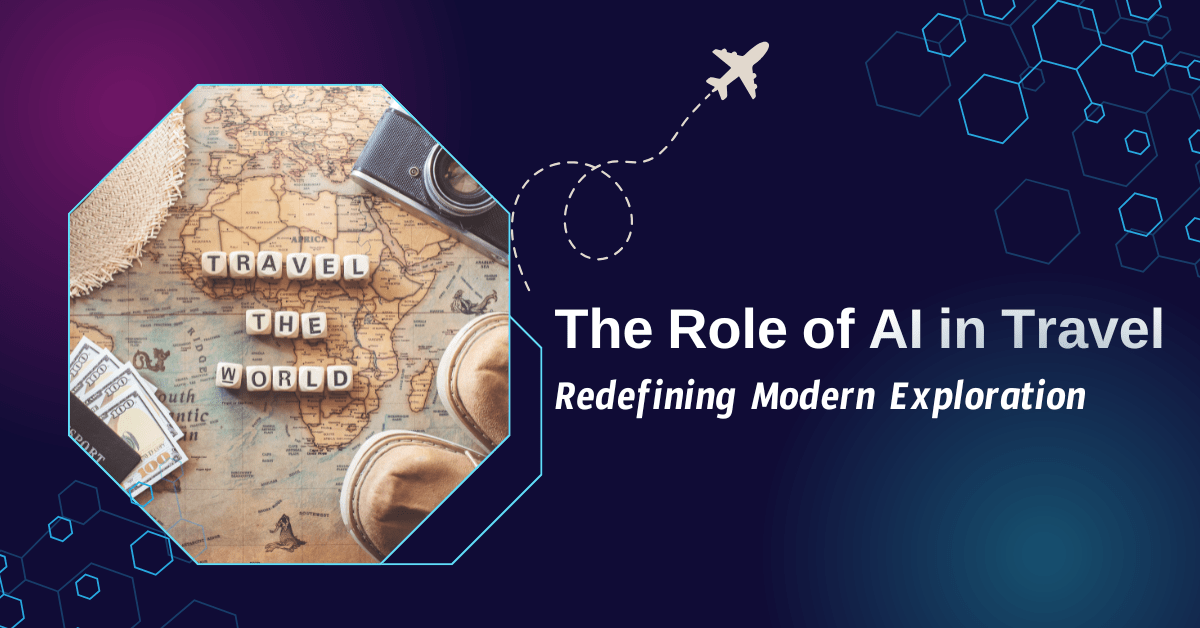Travel is more than a journey from point A to point B; it’s a narrative that weaves through cultures, landscapes, and experiences. But what if your journey could anticipate your preferences, save time, and offer seamless coordination? Artificial intelligence (AI) is doing just that, rewriting the travel story with innovation and precision. Let’s dive into the magnificent role of AI in travel.
What is AI in Travel?
AI in travel is transforming the way we explore the world, making journeys more personalized, efficient, and seamless. It employs AI to identify the traveler's requirements, streamline processes, and deliver a smooth end-to-end travel experience from the point of reservation and beyond. AI brings innovative features to the travel ecosystem, such as recommendation, instant support, and savvy decision-making, to harmonize convenience and organizational global efficiency.
Starting with knowing travelers' preferences to improve safety and sustainability, the use of artificial intelligence in travel goes beyond a binary service provision and provides meaningful and data-backed experiences. It means the transition to better, that is, wiser, more interconnected, and optimized travel in every one of its elements.
Do You Know?
As stated in the latest reports, The Global AI in Travel Market size is expected to be worth around USD 2,903.7 Billion By 2033, from USD 131.7 Billion in 2023, growing at a CAGR of 36.25% during the forecast period from 2024 to 2033.
The Role Of AI in Travel
Look below to explore the role of artificial intelligence in travel:
Personalized Travel: The Art of Knowing You
AI: “Tell me your dreams, and I’ll plan your trip.”
AI makes this possible. Travel platforms are now empowered with machine learning algorithms that predict travelers’ needs and offer hyper-customized experiences. AI tailors suggestions not only based on past bookings but also by analyzing online behavior and preferences.
Example: Expedia’s Curated Escapes
Imagine logging into a travel app and finding options that perfectly align with your taste—whether it’s budget-friendly city tours or secluded luxury villas. This is the magic Expedia delivers with its personalization engine, which has improved its conversion rates by 30%.
A Data-Driven Insight
According to a Skift report, 57% of travelers expect brands to offer tailored recommendations, making personalization a crucial differentiator in the travel industry.
Operational Efficiency: The Unseen Hero
AI: “Every second saved is a moment gained for exploration.”
Behind the glamorous side of travel lies a complex web of operations. AI works silently to optimize flight routes, prevent delays, and manage bookings seamlessly.
Airports That Never Sleep
Airports like Dubai International employ AI for real-time crowd management, reducing wait times by 40% during peak hours. By analyzing passenger movement, AI allocates resources dynamically, ensuring smoother operations.
Maintenance Before Malfunctions
Airlines like Lufthansa use predictive maintenance powered by AI to reduce technical disruptions. Their systems analyze thousands of flight hours to detect wear and tear early, saving millions in costs annually.
Smarter Customer Service: A Traveler’s Best Friend
AI: “Need help at 3 a.m.? AI is listening.”
Gone are the days of endless waiting on customer service hotlines. AI chatbots now handle most travel-related queries with unmatched speed and accuracy.
The Human-Like Touch
KLM Airlines’ chatbot delivers real-time updates on flight statuses, boarding gates, and even weather conditions at your destination. Travelers enjoy convenience while airlines save operational costs.
Why It Matters
According to Business Insider, 85% of customer interactions in the travel sector are now powered by AI, dramatically enhancing response times and accuracy.
Safety and Security: Invisible Yet Indispensable
AI: “Peace of mind is the real luxury.”
AI’s role extends far beyond convenience. It also ensures safety, from biometric check-ins to cybersecurity for personal data.
Fast-Tracking Airport Security
Facial recognition systems powered by AI are speeding up passenger screenings. Delta Airlines reports reducing boarding times by 9 minutes per flight, streamlining operations during peak hours.
Fraud Prevention on the Rise
AI algorithms scan millions of transactions daily to detect fraudulent activities on booking platforms, ensuring a secure experience for travelers.
Sustainability in Travel: Green Journeys
AI: “Travel smart, travel green.”
Sustainability is more than a buzzword in today’s travel landscape—it’s an obligation. AI is enabling eco-friendly innovations, from reducing waste to optimizing resource use.
Energy-Efficient Hotels
Chains like Marriott are leveraging AI to control lighting, heating, and cooling in rooms. These systems adjust based on occupancy, cutting energy usage by 15% annually.
Efficient Flight Routes
AI helps airlines reduce fuel consumption by suggesting the most efficient routes, significantly lowering carbon emissions.
Conclusion
The future of AI and ML will drastically impact the everyday lives of people around the world, and travel is no exception. AI is not just a tool; it’s the silent partner making travel more efficient, safe, and personalized. With every click, booking, and check-in, it reshapes the way we explore the world. As we turn the page into 2025, AI promises to make every journey a masterpiece—designed just for you. AI in travel is truly a transformative force.
Ultimately, travel remains the greatest chapter of the human story, now written with the ink of intelligence and innovation.

